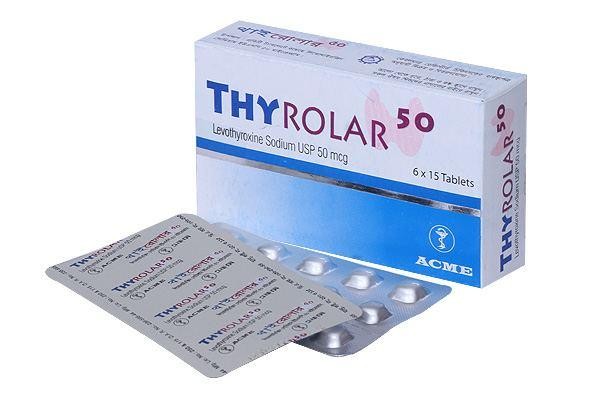
liotrix – oral, Thyrolar
Medication Uses How To Use Side Effects Precautions Drug Interactions Overdose Notes Missed Dose Storage WARNING: This medication should not be used for weight loss. Normal doses of this medication will not work for weight loss, and large doses may cause serious, possibly fatal side effects, especially when taken with diet pills. USES: See also Warning section. Liotrix treats an underactive thyroid (hypothyroidism). It replaces or provides more of a certain natural substance (thyroid hormone) normally produced by the thyroid gland. Low thyroid hormone levels can occur naturally or when the thyroid gland is injured by radiation/medications or removed by surgery. Having enough thyroid hormone in your bloodstream is important for maintaining normal mental and physical activity. In children, having enough thyroid hormone is important for normal mental and physical development. This medication also treats other types of thyroid disorders (e.g., certain goiters, thyroid cancer). It should not be used to treat infertility caused by low thyroid hormone levels. HOW TO USE: Take this medication by mouth, usually once a day on an empty stomach, 30 minutes to 1 hour before breakfast, or as directed by your doctor. Dosage is based on your medical condition, laboratory test results, and response to treatment. For children, the dosage is also based on age. Your doctor will usually start you on a low dose and slowly increase your dose as needed. Use this medication regularly to get the most benefit from it. To help you remember, take it at the same time each day. Do not stop taking this medication without first consulting with your doctor. Thyroid replacement treatment is usually taken for life. Symptoms of low thyroid hormone levels include tiredness, muscle aches, constipation, dry skin, weight gain, slow heartbeat, or sensitivity to cold. Tell your doctor if your condition worsens or persists after several weeks of taking this medication. SIDE EFFECTS: Some hair loss may occur during the first few months of starting this drug. This effect is usually temporary as your body adjusts. If this effect persists or worsens, tell your doctor or pharmacist. Remember that your doctor has prescribed this medication because the benefit is greater than the risk of side effects. Many people using this medication do not have serious side effects. Tell your doctor immediately if any of these serious effects occur: diarrhea, bone pain, headache, mood changes (e.g., nervousness, mood swings), shaking (tremor), sensitivity to heat, increased sweating, tiredness. Seek immediate medical attention if any of these rare but serious effects occur: chest pain, fast/irregular heartbeat, seizures, swelling of the ankles/feet. A serious allergic reaction to this drug is rare. However, seek immediate medical attention if you notice any symptoms of a serious allergic reaction, including: rash, itching/swelling (especially of the face/tongue/throat), severe dizziness, trouble breathing. This is not a complete list of possible side effects. If you notice other effects not listed above, contact your doctor or pharmacist. PRECAUTIONS: Before taking liotrix, tell your doctor or pharmacist if you are allergic to it or have any other allergies. This product may contain inactive ingredients that can cause allergic reactions or other problems. Talk to your pharmacist for more details. This medication should not be used if you have certain medical conditions. Before using this medicine, consult your doctor or pharmacist if you have: increased thyroid hormones (thyrotoxicosis), a heart attack (acute myocardial infarction), adrenal gland problem (e.g., uncorrected adrenal insufficiency). Before using this medication, tell your doctor or pharmacist your medical history, especially of: heart disease (e.g., coronary artery disease, irregular heartbeat), high blood pressure, diabetes, other hormone disorders (e.g., decreased pituitary hormone). If you have diabetes, this medication may increase your blood sugar levels. Check your blood glucose levels regularly as directed by your doctor. Tell your doctor immediately if you have symptoms of high blood sugar, such as increased thirst and urination. Your anti-diabetic medication or diet may need to be adjusted. Before surgery, tell your doctor or dentist that you are taking this medication. Caution is advised when using this drug in the elderly because they may be more sensitive to the effects on the heart caused by high thyroid hormone levels. Current information shows that this drug may be used during pregnancy. Tell your doctor if you are pregnant or become pregnant because your dose may need to be adjusted. Small amounts of this medication pass into breast milk. Consult your doctor before breast-feeding. DRUG INTERACTIONS: Your doctor or pharmacist may already be aware of any possible drug interactions and may be monitoring you. Do not start, stop, or change the dosage of any medicine before checking with your doctor or pharmacist. Before using this medication, tell your doctor or pharmacist of all prescription and nonprescription/herbal products you may use, especially: androgens/anabolic steroids, beta blockers, "blood thinners", corticosteroids, cytokines, digoxin, drugs affecting liver enzymes, drugs decreasing thyroid hormone levels, estrogen-containing products, growth hormones, medications for depression, theophylline. Certain medications may decrease the amount of liotrix absorbed. If you are taking any of these drugs, separate them from this medication by at least 4 hours. Check the labels on all your medicines because they may contain ingredients that could increase your heart rate or blood pressure. Ask your pharmacist about using those products safely. This document does not contain all possible interactions. Therefore, before using this product, tell your doctor or pharmacist of all the products you use. Keep a list of all your medications and share it with your doctor and pharmacist.
QUESTION
OVERDOSE: If overdose is suspected, contact a poison control center or emergency room immediately. US residents can call their local poison control center at 1-800-222-1222. Canada residents can call a provincial poison control center. Symptoms of overdose may include: fast/pounding/irregular heartbeat, loss of consciousness, confusion, slurred speech, seizures. NOTES: Do not share this medication with others. Laboratory and/or medical tests should be performed periodically to monitor your progress or check for side effects. Consult your doctor for more details. MISSED DOSE: If you miss a dose, take it as soon as you remember. If it is near the time of the next dose, skip the missed dose and resume your usual dosing schedule. Do not double the dose to catch up unless your doctor instructs you to do so. Call your doctor if you miss 2 or more doses in a row. Ask your doctor ahead of time what to do about a missed dose and follow your doctor’s specific directions. STORAGE: Store in the refrigerator between 36-46 degrees F (2-8 degrees C) away from light. Keep all medicines away from children and pets. Do not flush medications down the toilet or pour them into a drain unless instructed to do so. Properly discard this product when it is expired or no longer needed. Consult your pharmacist or local waste disposal company for more details about how to safely discard your product. Information last revised March 2013. Copyright(c) 2013 First Databank, Inc.
OVERDOSE: If overdose is suspected, contact a poison control center or emergency room immediately. US residents can call their local poison control center at 1-800-222-1222. Canada residents can call a provincial poison control center. Symptoms of overdose may include: fast/pounding/irregular heartbeat, loss of consciousness, confusion, slurred speech, seizures. NOTES: Do not share this medication with others. Laboratory and/or medical tests should be performed periodically to monitor your progress or check for side effects. Consult your doctor for more details. MISSED DOSE: If you miss a dose, take it as soon as you remember. If it is near the time of the next dose, skip the missed dose and resume your usual dosing schedule. Do not double the dose unless your doctor instructs you to do so. Call your doctor if you miss 2 or more doses in a row. Ask your doctor ahead of time what to do about a missed dose and follow your doctor’s specific directions. STORAGE: Store in the refrigerator between 36-46 degrees F (2-8 degrees C) away from light. Keep all medicines away from children and pets. Do not flush medications down the toilet or pour them into a drain unless instructed to do so. Properly discard this product when it is expired or no longer needed. Consult your pharmacist or local waste disposal company for more details about how to safely discard your product. Information last revised March 2013. Copyright(c) 2013 First Databank, Inc.


